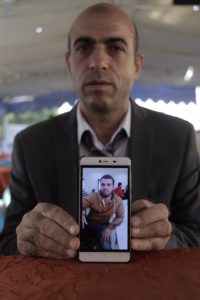
coutesy- https://twitter.com/orhamilton
SEPTEMBER 13, 2017
CAIRO — For years Ebrahim Metwally Hegazy, an Egyptian human rights lawyer, documented the plight of Egyptians who vanished into the hidden recesses of his country’s powerful security apparatus.
Mr. Hegazy had a personal stake in the issue: one of his sons disappeared at an Islamist rally in central Cairo in 2013 and has never been found.
Then this week Mr. Hegazy himself suddenly disappeared without a trace and for a brief time joined the ranks of the people he has represented.
Human rights activists have frequently been harassed by the Egyptian authorities, and Human Rights Watch issued a report just last week that accused the police and security forces of torture and other abuses.
Mr. Hegazy, 53, went to Cairo’s international airport on Sunday to catch a flight to Geneva, where he was scheduled to testify before the United Nations working group on enforced or involuntary disappearances, which investigates such cases.
Hours later one of Mr. Hegazy’s friends received a message, sent from Mr. Hegazy’s phone, saying he was about to take off.
But Mr. Hegazy never landed in Geneva.
He turned up two days later when another lawyer, having heard of Mr. Hegazy’s disappearance, saw him at the office of a state prosecutor in Cairo. Mr. Hegazy had not been allowed to see a lawyer or make a phone call.
On Wednesday, the prosecutor said Mr. Hegazy was being detained for 15 days on charges of disseminating fake news and running an illegal organization. He is being held at the maximum-security wing of the Tora prison outside Cairo.
The harassment of human rights activists is common in Cairo, but Mr. Hegazy’s case comes at a delicate moment for President Abdel Fattah el-Sisi of Egypt, whose notoriously poor human rights record has come under intensified international scrutiny of late and even earned him a rare punishment from the United States.
The State Department said last month that it was cutting or suspending $300 million in annual aid to Egypt, partly in reaction to a harsh law, signed by Mr. Sisi in May, that makes it impossible for some civil rights groups to operate in the country.
The Egyptian authorities reacted furiously last week to the Human Rights Watch report, based on interviews with 19 former detainees, that accused Egypt’s police and security forces of committing torture and other gross abuses.
Egypt blocked access to the Human Rights Watch website, adding it to a list of more than 400 websites banned in the country since June.
Officials and pro-government media outlets attacked Human Rights Watch, which responded by making copies of the report available via websites that the Egyptian government has not blocked.
Mr. Hegazy’s case has greater resonance for its ties to the case of Giulio Regeni, an Italian student whose battered body was found in Cairo in February 2016, nine days after he disappeared, leading to a diplomatic furor with Italy that still dominates relations between the countries.
Mr. Hegazy helped to investigate the circumstances of Mr. Regeni’s death, said Mohamed Lotfy, executive director of the Egyptian Commission for Rights and Freedoms, which is representing the Regeni family in Egypt.
Mr. Hegazy had intended to testify about the case before the United Nations panel in Geneva, he said.
The Regeni case, which has become a news media sensation in Italy, is back in the headlines as Italy and Egypt make tentative efforts to repair relations after a bruising period. Italy’s ambassador to Egypt, Giampaolo Cantini, arrived in Cairo on Wednesday after an absence of nearly 18 months.
Italy withdrew its ambassador to Egypt in April 2016 in protest at what Italian officials called Egyptian obstruction of the Regeni murder investigation. Italian investigators, and some senior American officials, believe members of the Egyptian security forces tortured and killed Mr. Regeni.
Mr. Regeni’s parents criticized Italy’s decision to send the ambassador back to Cairo, saying the government had surrendered its main leverage against Mr. Sisi. Italian officials countered that they need a full diplomatic presence in Cairo to help solve the case.
On Wednesday, Prime Minister Paolo Gentiloni of Italy said the Regeni investigation remained “a duty of the state.”
Many Egyptians who have taken up the Regeni case — as well as the cases of hundreds of Egyptians who have also disappeared in recent years — have suffered harassment or been otherwise silenced.
Mr. Hegazy became active in July 2013 after his son, Amr, disappeared during the military’s ouster of the Islamist president, Mohamed Morsi of the Muslim Brotherhood, which paved the way for Mr. Sisi to come to power.
As he searched for his son, Mr. Hegazy founded the Association of the Families of the Disappeared, a prominent campaigning group that has taken legal action on behalf of many people who have vanished.
Such work is increasingly perilous in Egypt, and many journalists, lawyers and civil society activists have been detained at Egypt’s airports or prevented from traveling abroad.
Mr. Lotfy said he warned Mr. Hegazy last week against going to Switzerland, saying that the authorities might not let him onto the flight.
“He wouldn’t listen,” Mr. Lotfy said. “He told me ‘I’ve got nothing to lose. They’ve already got my son.’ ”
September 15, 2017 at 4:47 pm
The situation of human rights in Egypt is horrible with maximum security operations and torture of civil right activists. The case of Hegazy is an example